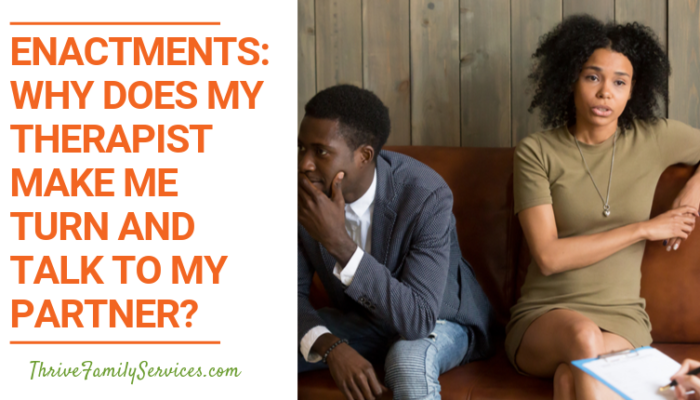One of the most frequent protests an Emotionally Focused Therapist hears is about the “turn and share” part of therapy. In Emotionally Focused Therapy we refer to these mini impromptu conversations as enactments.
“Didn’t I just say it?”
“This is awkward.”
“They already know.”
“They just heard me.”
With the majority of couples entering therapy due to communication issues, it’s a surprise how many couples are reticent to talk to each other throughout the session.
Therapists can talk about communication till they’re blue in the face or hand out worksheets every session, but it’s not effective or impactful until clients actually start doing something different—communicating effectively! That’s where enactments come in.
“Why Do I Have To Tell Them That?”
While it may be more comfortable at the start to talk to your partner through your therapist, this triangulation will not serve you outside the office. Your therapist is not your referee and they will not come home with you.
Enactments are one of the most important parts of Emotionally Focused Couples therapy. They take your experience from superficial memorization to a deep emotional experience with your partner.
What’s going on during enactments?
One of the first reasons your therapist may prompt you to turn and talk to your partner is simply just to see what happens.
It’s likely that whatever happens between you two in the therapy office when you try to talk also frequently happens at home.
- Are you able to be vulnerable with your partner?
- Does it just turn to blaming and defending?
- Do you clam up and freeze?
These are all important interaction dynamics to be curious about. Enactments can help you and your therapist identify your negative cycle.
Owning Up
One crucial, vulnerable, but necessary part of couples therapy is identifying your actions and responses to your partner in the negative cycle.
It’s important to note how you have contributed to this stuck spot. Remember, we made this mess together. Taking ownership of your part can be validating and even reassuring for your partner. This alone can begin to de-escalate things.
Couples need to be able to see the same picture of their disconnection in order to try to work on it, and enactments can help bring that picture to life.
Changing Patterns
Most couples enter therapy with a very rigid negative cycle of interaction. Partners only see one facet of each other’s emotional experience.
A therapist will use an enactment to help a partner express a part that has either been hidden from their partner or out of their own awareness.
You can’t get a new outcome with the same dysfunctional input. If you identify a new part, you better believe you need to share it with your partner if you want things to shift!
Increasing Emotional Connection
It’s one thing to rant to your therapist about your partner. It’s another thing to turn and look them in the eye during an enactment and tell them how they’ve hurt you or scared you.
The simple act of vulnerably and honestly sharing your emotions with your partner can begin to help you have a deeper emotional experience in therapy.
If you want the love you see in the movies, you need to have the risk. Reaching to your partner directly for your needs is a necessary first step to getting to that powerful bonding moment.
Improving Communication Skills
Social scientists say humans are never not communicating. While this may be true, it’s important you know what to communicate and how. Generally, it’s not about what you say, but how you say it.
It’s likely in your negative cycle you may frequently leave parts out. Or, it may even be the opposite, and you snowball your partner with all the details. In therapy, you will learn to pick out the juicy important parts of your reactions and share those with your partner.
Practice Makes Perfect
Therapists are essentially talking themselves out of a job. Their goal is to have their clients reach the day where they come in and say,
“We don’t need therapy anymore. We can do this on our own.”
In order to empower you to be securely attached with your partner, therapists must help to guide you to express yourself more vulnerably and honestly. Once you can start reaching for each other on your own, you will no longer need that outside support.
This is what Dr. Brooke Feeney refers to as the Dependency Paradox. The more people are dependent on their partner for support, the more they are free to be independent and autonomous.
If you want to make it better, you have to talk about it!
Schedule a couples counseling session with one of our Centennial Couples Therapists today and let us help you free your relationship using enactments!




